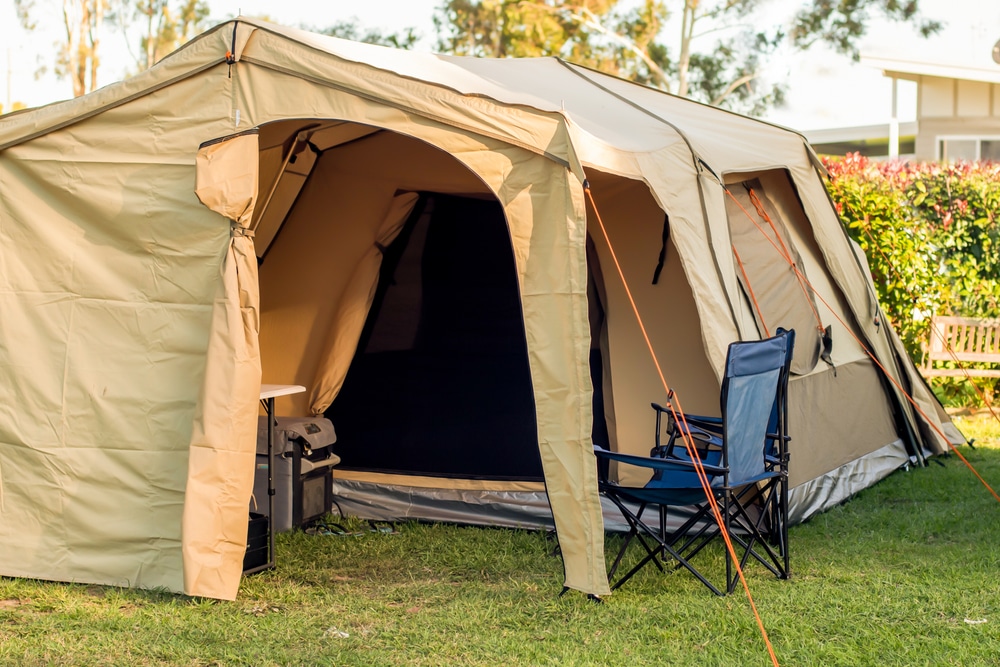
From special events to shelter and storage needs, the use of tents is commonplace in many industries. Depending on what the tent is being used for, temporary cooling and heating equipment may be necessary. Here’s how to determine what type of HVAC solution you need for your tent setup.
At 1 Source Portable Air, we're proud to offer the very best selection of HVAC rental products. When planning your temporary cooling and heating needs for a tented application, what are the major elements that will dictate your equipment selections? Here are several, all of which we’re happy to discuss in further detail to ensure you get the best solution for your project.
Naturally, the first area to look at is the size of the tent itself. How much space is inside the tent, and how many people will be occupying that space on average? This will play a role in how much cooling or heating power you'll need from your portable HVAC equipment.
For example, a smaller tent for a more intimate gathering may only require spot cooling or heating. However, a larger tent with dozens or even hundreds of people inside may require a larger or more comprehensive solution, including industrial air conditioners, multiple spot coolers, evaporative coolers, indirect fired heaters, electric heaters, or a combination of those units. Our team can help you make the right selections based on the specific dimensions and usage patterns you're planning for.
A related consideration is equipment placement. Depending on the application, you may be able to situate your HVAC equipment directly next to the tent. However, for other projects, like weddings or corporate functions, it may be necessary to position the units in a more discreet location. Proximity to the tent will also dictate the amount of ducting required. The 1 Source Portable Air team can walk you through all of these considerations to ensure sufficient ducting and proper site setup.
The next important consideration is the material of the tent. How well insulated is it? What kind of ventilation does it have? Will the tent be fully enclosed? If your tent is made from a thinner or less insulating fabric, you may need to account for that in terms of the portable HVAC capacity you select.
For example, an uninsulated tent may require more heating or cooling power to maintain a comfortable temperature than one that's better insulated against the elements. Conversely, a tent with good ventilation may require less power to maintain a comfortable temperature, as there will be more airflow to help distribute the heating or cooling evenly.
Another key consideration is how long you'll be using the tent, and what kind of temperature conditions you can expect outside. If you're only using the tent for a day or two and mild to moderate weather is expected, your portable HVAC needs will be different than if you're using the tent for weeks on end in extreme heat or cold.
A short-term tent setup in warm weather, for instance, may only require spot cooling solutions, while extended usein cold weather may require more comprehensive heating solutions. The experts at 1 Source Portable Air can walk you through suitable options based on your specific needs.
While the actual size of the tent is very important, a separate, but equally important, consideration is the number of people who will be occupying the space on a regular basis. More people in the tent means more body heat, which can impact how much cooling or heating power you need.
For example, two tents may be the same size but have different HVAC requirements depending on how many people are inside.
Planned activities within the tent will have a significant impact on HVAC needs. If your tent is being used for physical activity, for example, you may need more cooling power to keep people comfortable.
Conversely, if your tent is being used for a more sedate activity like a meeting or presentation, you may need less cooling power but more heating power to keep the space warm.
In certain cases, the presence of other equipment inside the tent can impact your portable HVAC needs. For example, electronic equipment produces residual heat which may raise the temperature inside the tent. In this case, you may need less heating power but more cooling power to keep people comfortable.
As you can see, there are a number of factors to consider when determining your portable HVAC needs for tented applications. Fortunately, the team at 1 Source Portable Air is here to help. Our seasoned veterans have years of experience helping people choose the right portable HVAC solutions for their tents, and we can help you make the right choices based on your specific needs.
Contact us today to learn more about our services, and we'll be happy to answer any questions you have. We look forward to speaking with you!